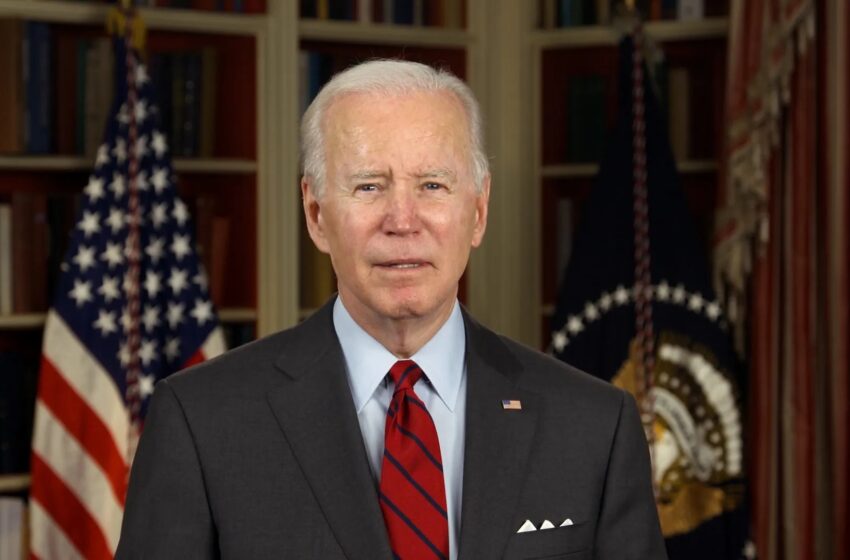Asian American support for Biden declines sharply by 8 points

President Joe Biden; photo credit: The White House
Embattled Democratic President Joe Biden still leads presumptive Republican nominee Donald Trump among Asian American Voters, but his support has declined sharply by eight points compared to 2020, according to a new poll.
As many as 46% are likely to vote for Biden, down eight percentage points since 2020, while 31% are likely to vote for Trump, gaining one point since 2020, according to the bi-annual Asian American Voter Survey (AAVS) released July 10.
As many as 90% of Asian Americans intend to vote in November, despite 42% not having been contacted by either the Democratic or Republican parties or candidates.
The survey of 2,479 Asian American voters from the six largest ethnic groups — Chinese, Indian, Filipino, Korean, Vietnamese, and Japanese— was jointly conducted by Asian and Pacific Islander American Vote (APIAVote), AAPI Data, Asian Americans Advancing Justice – AAJC, and AARP.
READ: Who could be Kamala Harris’ VP if she replaces Biden? (July 6, 2024)
Asian Americans have been a rapidly growing group of eligible voters in the US over the past two decades, growing by 15% in the last four years alone and turning out in record numbers in every federal election since 2016. In 2020, a surge in Asian American voters – especially those voting for the very first time – in battleground states was crucial to Biden’s victory, according to the survey.
“Asian Americans are rapidly diversifying the American electorate, and it is critical for us to update our understanding of what motivates them and informs their voting choices,” said Karthick Ramakrishnan, Executive Director of AAPI Data.
“We see ongoing evidence of dynamism within the Asian American electorate, including on matters pertaining to presidential vote choice and party preferences on key issues ranging from inflation to health care and immigration.”
Indian American support for Vice President Kamala Harris has also diminished, with just 16% of Indian Americans saying they view her very favorably, and 38% saying they view her somewhat favorably.
About 48% view her unfavorably, while 4% say they don’t know enough about her. Harris has been discussed as the obvious choice to lead the Democratic ticket should Biden choose to drop out after his disastrous performance in the first presidential debate.
“Harris is associated with Biden. So I think that accounts for some of that diminishment in support,” said Ramakrishnan, adding that perceptions of a poor performance on immigration may also have played a role. “It’s a far cry from what we saw in 2020, where you saw an outburst of pride among Indian Americans and South Asians. I think some of that novelty has likely worn off.”
“But looking ahead, if there is an opportunity for Harris to be a potential candidate for president this year, I think you’ll probably see another burst of activity and potentially another burst of pride.”
Support for former Indian American Republican presidential hopefuls Nikki Haley and Vivek Ramaswamy were slightly higher among Indian Americans.
“There may be such a thing as ethnic pride, but it does not hold a candle to partisanship, which is the biggest determinant of how Indian Americans will vote,” said Ramakrishnan.
Key Findings:
- 46% say they’ll likely vote for Biden (down from 54% in 2020), 31% say they’ll likely vote for Trump (compared to 30% in 2020), and 5% say they’ll likely vote for someone else (up from 1% in 2020). The remainder are undecided or refuse to answer how they will vote.
- 62% view Trump unfavorably including 43% who view him very unfavorably. Meanwhile, 44% view Biden unfavorably, including 23% very unfavorably.
- 42% identify as Democrats (compared to 44% in 2020), 22% identify as Republicans (compared to 23% in 2020), and 31% identify as Independent (compared to 25% in 2020).
- Asian American voters prefer Democratic candidates over Republicans for the U.S. House (51% vs. 30%) and Senate (50% vs. 30%).
- 90% of Asian American voters say they plan to vote for President, Congress and other offices this November. A further 68% say that they are absolutely certain they will vote.
- 42% of Asian American voters say they have not been contacted by either the Democratic or Republican parties or candidates, including 50% who say they have not been contacted by the Democratic Party and 57% who say they have not been contacted by the Republican Party.
- Among the most important issues for Asian American voters include jobs and the economy (86% say “extremely” or “very” important), inflation (85%), healthcare (85%), crime (80%), education (80%), Social Security and Medicare (79%), cost of housing (78%), national security (77%), gun control (73%), and immigration (71%).
- Over a two-thirds majority (68%) of Asian American voters reported worrying about hate crimes, harassment, and discrimination “sometimes” (38%), “somewhat often” (17%), or “very often” (13%).
